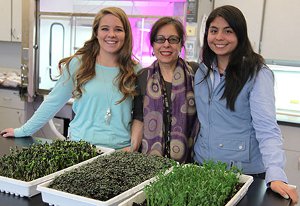December 30, 2014
 How do you get girls interested in STEM (Science, Technology, Engineering and Math) fields?
How do you get girls interested in STEM (Science, Technology, Engineering and Math) fields?
Consider showing them some stems.
Real, live, green ones, that is, with leaves growing. Put the girls — young women, really — in charge, from planting the microgreens to tending them to monitoring them. Charge them with running experiments and collecting data, like whether the greens grow better under fluorescent lights or LED lights, and whether plain water or fish tank water is more nourishing. Let them harvest, and judge which kind tastes best.
That’s what intern Karla Vega and student Taylor West did this semester in a lab on NMC’s Great Lakes campus. The pair forged a research partnership that not only bridged language and cultural barriers but helps lay the groundwork for sustainable, indoor agriculture that could eventually improve the diets of millions.
“To get girls engaged in science we need to let them make decisions, give them room to make mistakes and try things out on their own,” said NMC Water Studies Institute Education and Outreach Coordinator Constanza Hazelwood, who supervised Vega and West’s research this semester.
NMC and EARTH University
Vega is a Bolivian student at EARTH University in Costa Rica, a leading institution in agricultural sciences and sustainable development. Hazelwood has cultivated connections at EARTH since 2009 and was looking to take the hydroponic vertical agriculture project she started a year ago to the next level. Enter Vega on a semester-long internship.
“Karla came with a lot of expertise in what we’re doing. She brought a lot of innovation to what we’re doing in the lab,” Hazelwood said.
The challenge of the vertical agriculture project bonded Vega, 20, who studies agronomy and natural resources management in Costa Rica, and West, 21, whose science interest was piqued in a high school agriscience program.
“People say, ‘why agriculture when you are from a city?’” said Vega, whose home city, Cochabamba, is home to almost 2 million people. “It was a challenge. This project can be used inside cities, where they don’t have space to grow crops.”
“That’s what women like, is a challenge,” said West.
The challenge will continue next semester, when West will visit Vega at EARTH, joining Hazelwood’s fifth study abroad trip to Costa Rica.
“The tables are going to be turned,” said West, who said her Spanish skills are negligible but expressed no concern about immersing herself in the language.
Hazelwood, too, has no doubts both students will continue to flourish. She notes that the pair made the greatest gains after the male student who originally supervised the vertical agriculture project left.
“They believe in themselves. They’re very self-confident,” she said. “It is about believing in them, at times it is getting out of their way, but always being available to support them.”
